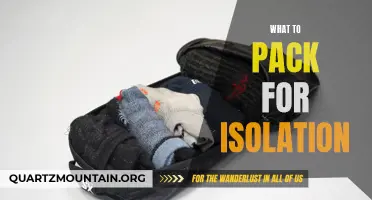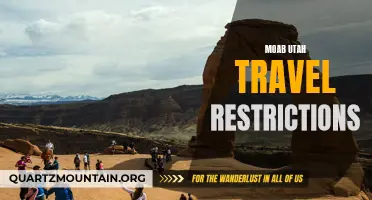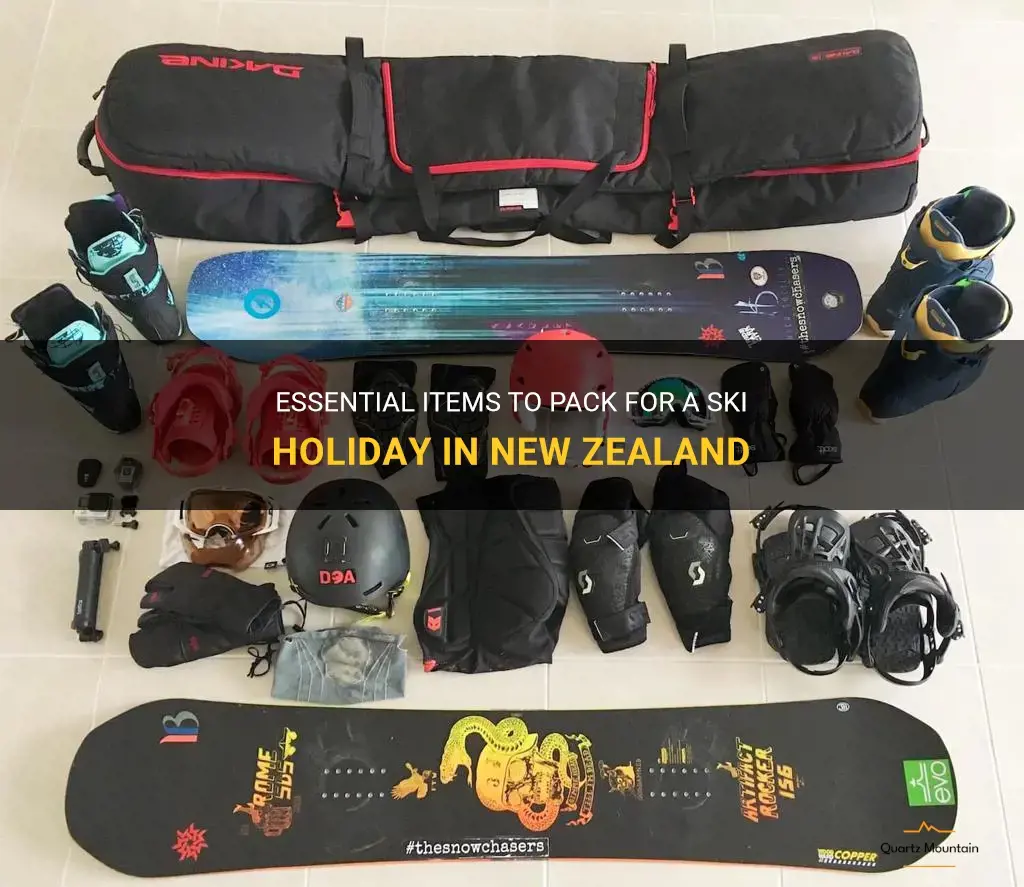
When it comes to planning a ski holiday in New Zealand, there are a few essential items that you simply can't leave home without. From warm clothing and sturdy boots to waterproof accessories and high-protection sunscreen, packing for a ski trip requires careful consideration. Whether you're a seasoned skier or a first-time visitor to the slopes, this guide will help ensure that you have everything you need to enjoy a fantastic winter adventure in the breathtaking mountains of New Zealand. So grab your gear and prepare for a snow-filled escapade like no other!
| Characteristics | Values |
|---|---|
| Clothing | Warm and waterproof clothing, layers, thermal underwear, socks, hats, gloves, scarves |
| Ski equipment | Skis/snowboard, bindings, poles, boots |
| Snow gear | Helmet, goggles, ski/snowboard jacket and pants |
| Accessories | Sunscreen, lip balm, hand warmers, sunglasses, neck warmer |
| Footwear | Snow boots |
| Miscellaneous | Cash, ID, travel insurance, camera, snacks, water bottle |
What You'll Learn
- What are the essential clothing items to pack for a ski holiday in New Zealand?
- Do I need to bring my own ski/snowboard equipment, or can I rent it at the ski resorts in New Zealand?
- Are there any specific toiletries or personal care items that I should remember to pack for a ski holiday in New Zealand?
- Are there any specific items that I should bring for non-ski activities or downtime at the ski resorts in New Zealand?
- Are there any specific packing tips or recommendations for a ski holiday in New Zealand that might not apply to other ski destinations?

What are the essential clothing items to pack for a ski holiday in New Zealand?
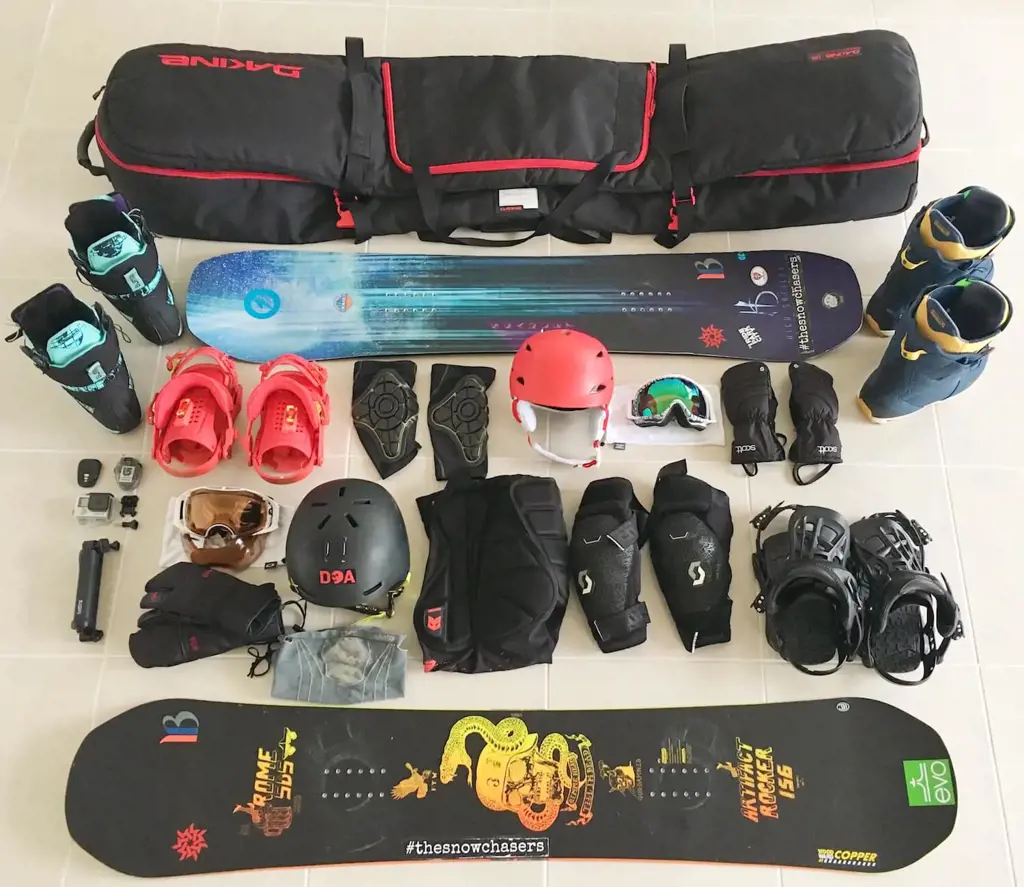
A ski holiday in New Zealand is an exciting adventure that offers breathtaking views and thrilling slopes. However, to fully enjoy your time on the mountain, it's crucial to pack the right clothing items. The New Zealand ski season typically runs from June to October, so it's essential to pack accordingly for the weather conditions you may encounter.
Here is a list of essential clothing items to pack for a ski holiday in New Zealand:
- Base Layers: A good base layer is the foundation of your ski outfit. Opt for moisture-wicking and insulating materials such as merino wool or synthetic fabrics. These will keep you warm and dry by wicking away moisture from your body.
- Mid Layers: On top of your base layer, you'll need mid-layers to provide additional insulation. Fleece jackets or down vests are excellent choices as they trap heat and provide warmth without adding too much bulk.
- Ski Jacket: A waterproof and windproof ski jacket is a must-have for a ski holiday. Look for jackets with adjustable hoods, cuffs, and hemlines to keep the snow out. Additionally, consider jackets with ventilation zippers to regulate your body temperature during intense activities.
- Ski Pants: Invest in a good pair of waterproof and insulated ski pants. Look for pants with reinforced knees and seat areas for added durability. Adjustable waistbands and leg openings will allow for a customized fit.
- Gloves or Mittens: Keeping your hands warm is essential on the slopes. Opt for waterproof and insulated gloves or mittens to protect your hands from the cold and wet conditions. Look for gloves with touchscreen compatibility, so you can easily use your smartphone without removing them.
- Hats or Beanies: Heat escapes from your head, so it's crucial to wear a hat or beanie to keep warm. Choose hats that cover your ears for added protection against the cold winds. Look for hats made from materials like wool or fleece for maximum warmth.
- Socks: Proper ski socks are a game-changer on the slopes. Opt for moisture-wicking and cushioned socks with a suitable height to prevent rubbing and blisters. Merino wool socks are an excellent choice as they provide insulation while keeping your feet dry.
- Neck Gaiter or Scarf: To protect your neck and face from the cold winds, pack a neck gaiter or scarf. These versatile accessories can also be pulled up to cover your nose and mouth during extremely cold conditions or used as a headband on sunny days.
- Goggles: Protect your eyes from snow glare and harsh winds by wearing goggles. Look for goggles with UV protection and anti-fog features. Consider choosing goggles with interchangeable lenses to adapt to changing weather and light conditions.
- Ski Helmet: Safety should be a top priority on the slopes. Wearing a ski helmet can protect your head from potential injuries. Choose a helmet that fits snugly and has vents for temperature regulation.
Remember to pack multiple pairs of base layers, socks, and gloves, as well as an extra set of mid-layers, in case the weather changes unexpectedly. Layering your clothing will allow you to adjust your warmth level according to the weather conditions and your activity level. It's also a good idea to pack a backpack to carry extra layers, snacks, and water while skiing.
By packing the right clothing items, you'll be well-prepared to hit the slopes and make the most of your ski holiday in New Zealand. Stay warm, stay safe, and enjoy the stunning scenery and exhilarating ski runs that the country has to offer.
Essential Items to Pack for a Successful Protest: A Comprehensive Guide
You may want to see also

Do I need to bring my own ski/snowboard equipment, or can I rent it at the ski resorts in New Zealand?
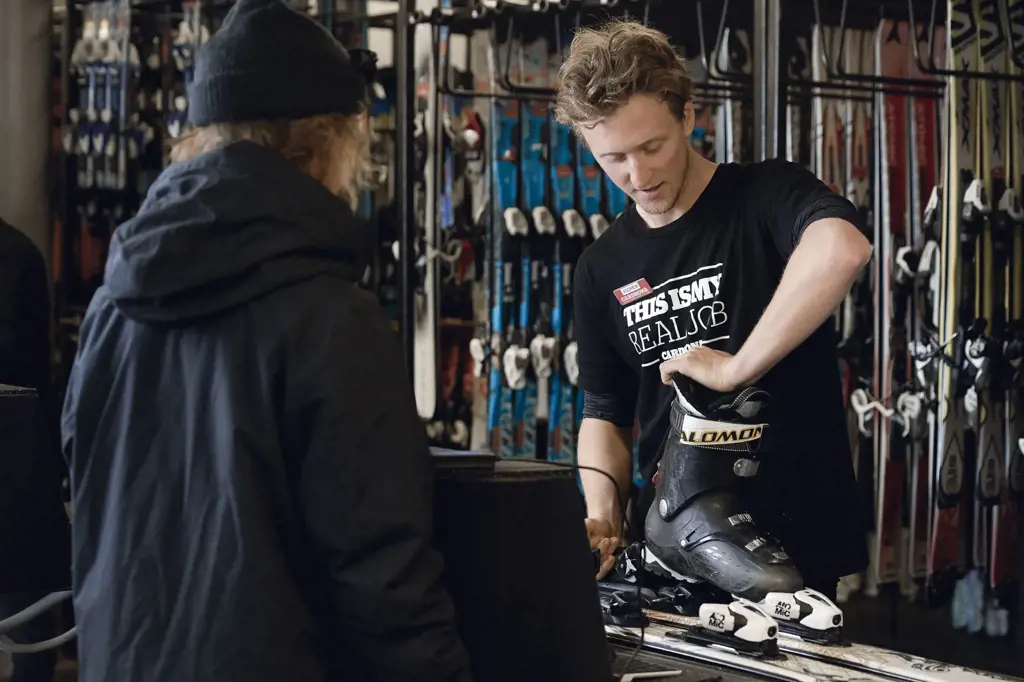
When planning a skiing or snowboarding trip to New Zealand, one common question that arises is whether it is necessary to bring your own equipment or if it is possible to rent it at the ski resorts. The good news is that most ski resorts in New Zealand offer equipment rental options, making it convenient for visitors who do not own their own gear.
Renting ski or snowboard equipment at the ski resorts in New Zealand is a popular choice for many reasons. Firstly, it eliminates the need to transport bulky equipment from your home country to New Zealand. This can save you money on baggage fees and avoid the hassle of lugging heavy gear around airports and hotels.
In addition to the convenience factor, renting equipment can also be a cost-effective option. Skiing and snowboarding equipment can be expensive to purchase, especially for occasional or beginner riders. Renting allows you to try out different brands and models, find the perfect fit, and avoid making a big financial investment upfront.
When renting equipment at ski resorts in New Zealand, you can expect a wide range of options to suit your skill level and preferences. Most rental shops offer a variety of skis and snowboards, ranging from beginner to advanced, as well as different sizes and styles. The staff at the rental shop can provide guidance and help you select the equipment that best suits your needs.
The process of renting equipment at the ski resorts is usually straightforward. Upon arrival at the resort, you can visit the rental shop and fill out the necessary paperwork. You will need to provide some personal information and potentially leave a deposit. The staff will then help you find the right equipment, adjust the bindings to your specifications, and ensure everything fits correctly.
It is important to note that renting equipment does not typically include accessories such as helmets, goggles, or clothing. These items are usually available for rent as well, or you can bring your own if you prefer. Many ski resorts prioritize safety and strongly recommend wearing a helmet while skiing or snowboarding.
Another advantage of renting equipment is the option to try out the latest gear and technology. Ski and snowboard manufacturers are constantly developing new equipment with improved performance and features. Renting allows you to stay up-to-date with the latest advancements without the need for frequent equipment upgrades.
Overall, renting ski or snowboard equipment at the ski resorts in New Zealand is a convenient and cost-effective option for visitors. It eliminates the need to transport heavy gear, provides a range of options to suit different skill levels, and allows you to try out the latest equipment. Whether you are a beginner or an experienced rider, renting equipment at the ski resorts in New Zealand ensures that you have everything you need for a memorable skiing or snowboarding experience.
Essential Items to Pack for a Trip to Lapland
You may want to see also

Are there any specific toiletries or personal care items that I should remember to pack for a ski holiday in New Zealand?

When planning a ski holiday in New Zealand, it is important to be well-prepared with the right toiletries and personal care items. Although you may have your ski gear and warm clothing sorted, there are a few additional items that you should remember to pack for a comfortable and enjoyable trip.
- Lip balm: The cold and dry climate in the mountains can cause chapped lips. Make sure to pack a good quality lip balm with SPF to protect your lips from sunburn and keep them moisturized.
- Sunscreen: Although you may not associate sunscreen with a ski holiday, it is essential to protect your skin from the harsh UV rays, especially at higher altitudes. Choose a broad-spectrum sunscreen with a high SPF and reapply it regularly throughout the day.
- Moisturizer: The cold and windy conditions on the slopes can be harsh on your skin, causing dryness and irritation. Pack a moisturizer that suits your skin type and apply it in the morning and evening to keep your skin hydrated.
- Hand cream: Constant exposure to cold temperatures can lead to dry and cracked hands. Bringing a hand cream will help to keep your hands moisturized and prevent discomfort.
- Facial wipes: After a day on the slopes, it can be refreshing to cleanse your face and remove any dirt or sweat. Facial wipes are convenient and easy to use, allowing you to clean your face quickly without the need for running water.
- Eye drops: The dry air and cold winds can cause dry and irritated eyes. Pack some lubricating eye drops to keep your eyes comfortable and prevent redness or discomfort.
- Shampoo and conditioner: Most ski resorts have showers and accommodations with basic amenities. However, it is a good idea to pack your preferred shampoo and conditioner to ensure that you have products that work well for your hair type.
- Body lotion: Skiing can be physically demanding, and your muscles may feel sore after a day on the slopes. Bring a soothing body lotion to moisturize your skin and provide relief to tired muscles.
- Deodorant: With all the physical activity and layers of clothing, it is essential to stay fresh. Pack your preferred deodorant to keep body odor at bay.
- First aid kit: Accidents can happen on the slopes, so it is wise to have a basic first aid kit on hand. Include items like band-aids, pain relievers, and any necessary prescription medications.
Remember to pack these toiletries and personal care items when planning your ski holiday in New Zealand. Taking care of your skin, lips, and overall well-being will ensure that you have a comfortable and enjoyable time on the slopes.
Essential Winter Packing List for a Trip to Switzerland
You may want to see also

Are there any specific items that I should bring for non-ski activities or downtime at the ski resorts in New Zealand?
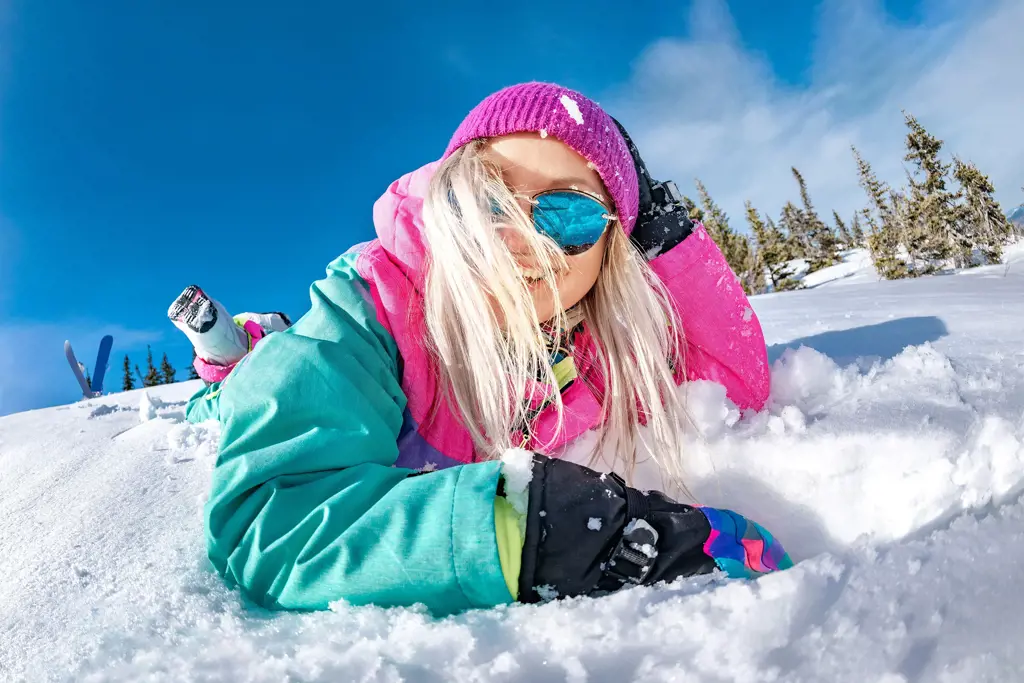
When planning a trip to a ski resort in New Zealand, it is important to consider not only the gear and equipment needed for skiing, but also the items that may be necessary for non-ski activities or downtime at the resort. While the specific items you need may vary depending on the activities you plan to participate in, there are several essential items that can enhance your overall experience.
- Warm Clothing: Even if you're not skiing, the weather in New Zealand's ski resorts can be quite chilly. It is essential to bring warm clothing, such as thermal layers, sweaters, hats, gloves, and scarves, to stay comfortable during non-ski activities or downtime at the resort.
- Comfortable Shoes: While skiing boots are necessary for skiing, it is also important to bring comfortable shoes for walking around the resort or participating in non-ski activities. Depending on the resort, you may find opportunities for snowshoeing, ice skating, or simply strolling through the wintery landscape.
- Entertainment: During downtime at the resort, it can be enjoyable to have some form of entertainment to pass the time. This could include books, magazines, puzzles, or even a portable gaming device. Bringing these items can help ensure that you have something to enjoy when not actively participating in activities.
- Camera: The ski resorts in New Zealand offer stunning natural landscapes and breathtaking views. Bringing a camera will allow you to capture these moments and create lasting memories of your trip. Whether you have a smartphone with a high-quality camera or a dedicated DSLR, having a camera on hand is a must.
- Swimwear: Some ski resorts in New Zealand also offer spa facilities with saunas, hot tubs, or heated swimming pools. Packing swimwear can allow you to relax and rejuvenate after a day on the slopes or participate in aquatic activities.
- Sun Protection: Even in winter, the sun's rays can be strong, especially at higher altitudes. It is important to bring sunscreen, sunglasses, and a hat to protect your skin and eyes from the sun's harmful UV rays.
- Snacks and Drinks: While most ski resorts have dining options available, it can be useful to bring some snacks and drinks to have on hand, especially during downtime or when participating in non-ski activities. Energy bars, trail mix, and water bottles can help keep you fueled and hydrated throughout the day.
These are just a few examples of the items you should consider bringing for non-ski activities or downtime at the ski resorts in New Zealand. It is important to research the specific activities and amenities available at the resort you plan to visit to ensure you come prepared for a relaxing and enjoyable experience.
Essential Items to Pack for a Relaxing Trip to Glen Ivy Hot Springs
You may want to see also

Are there any specific packing tips or recommendations for a ski holiday in New Zealand that might not apply to other ski destinations?

When planning a ski holiday in New Zealand, it is important to consider the unique factors and climate of the country. Here are some specific packing tips and recommendations that might not apply to other ski destinations:
- Layering is essential: In New Zealand, the weather can change rapidly, so it is important to pack and dress in layers. Start with a thermal base layer, followed by a mid-layer for insulation, and finish with a waterproof and windproof outer layer. This way, you can easily adjust your clothing to adapt to the changing conditions on the slopes.
- Bring a good pair of goggles: The mountains in New Zealand are known for their stunning views, but they can also be prone to harsh weather conditions. Make sure to pack a high-quality pair of goggles that provide clear vision and protection from wind, snow, and sun. This will ensure that you can fully enjoy your skiing experience without any discomfort or visibility issues.
- Consider waterproof and breathable gear: While this tip applies to any ski destination, it is particularly important in New Zealand due to its unpredictable weather patterns. Look for ski pants and jackets that are both waterproof and breathable to keep you dry and comfortable on the slopes, no matter what the weather throws at you.
- Pack sunscreen and lip balm: The sun in New Zealand can be particularly strong, especially at higher altitudes. Even on cloudy days, UV rays can be intense, so it is crucial to protect your skin and lips from sunburn. Pack a high SPF sunscreen and a lip balm with sun protection to ensure that you don't end up with painful burns or chapped lips.
- Don't forget about après-ski clothing: After a day on the slopes, you will likely want to relax and unwind in the ski resort or nearby town. Pack some comfortable and stylish après-ski clothing, such as warm sweaters, cozy pants, and a pair of waterproof boots. This way, you can enjoy the après-ski scene in comfort and style.
- Rent some equipment: If you don't want to lug all your ski gear across the world, consider renting equipment in New Zealand. Most ski resorts have rental shops where you can find a wide range of gear suited to the local conditions. This will save you the hassle of packing and transporting your own equipment and ensure that you have the right gear for the unique terrain in New Zealand.
In conclusion, a ski holiday in New Zealand offers unique experiences and challenges, and packing accordingly can enhance your trip. Remember to layer your clothing, bring good goggles, opt for waterproof and breathable gear, protect yourself from the sun, pack appropriate après-ski clothing, and consider renting equipment. By following these tips, you will be well-prepared for a fantastic skiing adventure in the beautiful mountains of New Zealand.
Essential Items to Pack for an Unforgettable Trip to Lapland
You may want to see also
Frequently asked questions
When packing for a ski holiday in New Zealand, it is important to bring warm and waterproof clothing. This includes a ski jacket, ski pants, thermal layers, gloves, hats, and thick socks. It is also a good idea to bring some casual winter clothing for après-ski activities. Don't forget to pack a swimsuit for any hot pools or spa experiences!
If you have your own ski equipment and are comfortable traveling with it, it is a good idea to bring it. However, if you don't have your own equipment or prefer not to travel with it, most ski resorts in New Zealand offer equipment rental. Renting equipment can be a convenient and cost-effective option.
Yes, it is important to pack sunscreen for a ski holiday in New Zealand. Even though it may be cold and snowy, the sun's rays can still be strong at high altitudes and reflected off the snow. Make sure to apply and reapply sunscreen throughout the day, especially on your face and any exposed skin. Don't forget to also pack lip balm with SPF.
In addition to warm clothing and ski equipment, there are a few other essential items to pack for a ski holiday in New Zealand. These include goggles or sunglasses, a beanie or headband, a neck warmer or scarf, hand and toe warmers, a backpack or daypack for carrying snacks and extra layers, and a reusable water bottle to stay hydrated. It is also a good idea to pack a small first aid kit in case of any minor injuries on the slopes.





